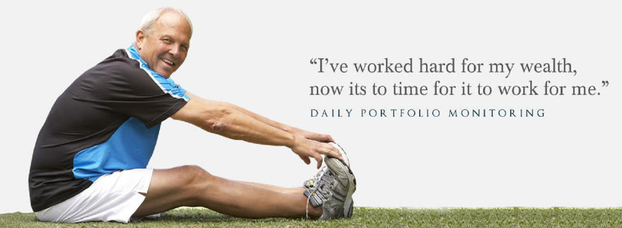In my previous article, 2012 - A Solemn Year For Retired Investors? ’Don’t Think So, I did shed light on some of the ways in which I managed to securely navigate the investments of my clients, to avoid many of the pitfalls which portfolio managers were facing in the backdrop of the slow financial season we experienced in 2011. I suggested that investing while the market is trending, as a matter of fact, is actually good for investors. You want to be investing while the market is trending but also be able to move the money to safety when it’s not, so that investors are able to meet their goals.

The Livability Factor – A Healthier Alternative For The Retired Wealth Investor
Private Wealth Management Practices That De-Stress Retired Investors
 The Livability Factor To Investment |
The Livability Factor - A Stress Free Solution To Investment Planning
This brings me to my next topic - The Livability Factor
The reasons why many investors fail to reach their investment goal are many. However, I believe that the #1 reason for this is because they’ve been told by a financial planner or advisor that they have to put their money and leave it in for a long period of time. Those advisors basically try to tell you that you should just ignore the short term (say 3, 6, or 12 months) market signals, because as long as you stick with the long term plan, you will do well over 5-10 years.
I have a problem with this position for several reasons:
- The first problem is that there are few investors who are willing to commit on the long term and understandably so. Take most retired investors for instance, whose retirement savings constitute the bulk of their investment income, they are not going to be content with an investment plan that only produces results on the long-term. At some point, the investor is going to reach his or her limit and they are going to throw up their hands saying ‘enough is enough!’ They will then call their financial planner and tell him or her to sell everything and move to cash.
- Secondly, when this happens, chances are, these investors will end up with a bad taste in their mouth about investing. The result is, they become reluctant in putting back money into ‘the market' because they’ve been burned.
- Emotionally, it also becomes difficult for them to forget their negative experience and believe that financial markets do work.
I have also equally observed that in many of such cases;
- The Wall Street System (WSS) tries to put the blame on the investors, telling them it is their fault that things turned out badly!
- That the reason the investor lost money is because he wasn’t brave or willing to suffer long enough to get back to even and start receiving the profits from his investments.
Well I completely disagree with this. The problem as I see it, certainly isn’t the investor, but in my opinion, it is the advisor’s lack of understanding. The problem is that, neither the investor nor the WSS advisor understood the importance of what I will call the Livability Factor.
 |
About The Livability Factor - What Retired Investors Need To Know
The Livability Factor refers to an investor’s ability to comfortably endure the difficult times so they are around for the good times. The livability factor focuses on the emotional needs of the investor. As a retired investor, you don’t want to invest your life’s retirement income and have to seat on the edge of your seat stressed out through the investment cycle!
What then do I mean by the emotional needs of the investor? Well, let me explain.
 It is true that over time, the financial markets do work. Over time, with careful financial planning, investing in the markets will help you grow your wealth, help you keep up with rising prices or give you a greater level of high income security than you can get at the bank. All of these will happen OVER TIME…
It is true that over time, the financial markets do work. Over time, with careful financial planning, investing in the markets will help you grow your wealth, help you keep up with rising prices or give you a greater level of high income security than you can get at the bank. All of these will happen OVER TIME…
So the key to achieving this is to stay in the game. When I say ‘stay in the game’, I’m not saying that investing is a game, it is not! It is on the contrary, a very serious business. Nor am I in any way suggesting that you have to remain fully invested in the stock market all the time - quite the opposite. There are certainly other ways in which your retirement income can be invested. But the only way to stay in the game long enough is to manage your money in such a way that you can survive the tough times and still be around to benefit from the good times.
And it’s easier to do than many may think. First, we need to identify what causes the typical investor to throw up their hands and quit. I will be discussing these causes in my next article titled:
About The Author
Jeff Voudrie is a Certified Financial Planner and nationally recognized financial advisor. Jeff has been in the financial industry for twenty-five years, and has been interviewed by The Wall Street Journal, CBS Marketwatch, Kiplinger's, The London Financial Times, The Christian Science Monitor, CFO.com and Financial Planning Magazine. For more information on Jeff, please visit: www.jeffvoudrie.com or www.commonsenseadvisors.com
Retirement Investment Planning For 2012 - Jeff Voudrie Shares His Thoughts
You might also like
July 15th 2013 The Hostess Twinkie Makes The Sweetest Comeback...Hostess will be back and the stock and on your local store shelves this July ...
Best Money Saving TipsEffective money saving tips which are common sense but useful.



 2012 Investment Forecast – A Great Year For Retired Wealth Investorson 03/23/2012
2012 Investment Forecast – A Great Year For Retired Wealth Investorson 03/23/2012
 The Investment Climate for 2012 – What Every Retired Investor Needs To Knowon 03/23/2012
The Investment Climate for 2012 – What Every Retired Investor Needs To Knowon 03/23/2012
 Conservative Or Aggressive Investment – How Should Retired Investors Proceed?on 03/23/2012
Conservative Or Aggressive Investment – How Should Retired Investors Proceed?on 03/23/2012
 2012 - A Solemn Year For Retired Investors? ’Don’t Think Soon 03/20/2012
2012 - A Solemn Year For Retired Investors? ’Don’t Think Soon 03/20/2012


Comments
You definitely need to watch your money closely and take action to switch it if something looks wrong. However, most people don't want the hassle that this involves